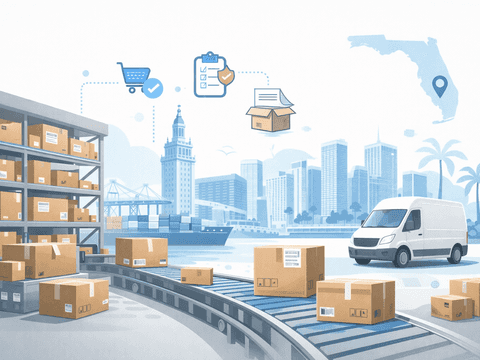TL,DR
- Bad service loses sales. In retail, one poor support interaction can end the next purchase
- Best retail help desk software matters. Choosing the right retail help desk keeps every ticket, order, and conversation in one system, improving response speed and consistency
- AI and omnichannel lead the way. Modern support pairs agents with AI to classify messages, suggest next steps, and deliver seamless help across store, web, and social
- Outvio Desk goes further. It is the only help desk that uses AI to automate support for both carriers and customers in the same workspace
Running a retail help desk is now a frontline task: every support exchange shapes the next purchase. A single, good reply keeps the conversation alive, while a confusing one sends shoppers elsewhere. Forbes confirms the impact: 70 percent of consumers spend more when their service experience feels positive and personal.
The surest way to meet that expectation is to choose the best help desk software, a platform that gathers orders, tickets, and customer history in one place to improve customer service experience with speed and context. Teams that work from this unified view see higher retention, longer lifetime value, and a smoother journey across store, web, and social.
Below you’ll find a clear overview of today’s leading options. Use it to match features and pricing with your goals and build support that consistently elevates the customer experience in 2026 and beyond.
Top-rated retail help desk
| Tool | G2 Rating | Core Strengths | Ideal For |
|---|---|---|---|
| Outvio Desk | ⭐ 4.8 | Unified help desk with built-in order tracking, returns, and AI. Combines support, logistics, and automation in one tool. | Retailers that want full post-purchase control without using multiple tools |
| Help Scout | ⭐ 4.4 | Simple shared inbox with AI replies and automation. | Small support teams needing a clean email-like interface |
| Freshdesk | ⭐ 4.4 | Flexible ticketing with omnichannel and chatbot support. | Teams managing support across channels with varied needs |
| Qpien | ⭐ 4.0 | Unified inbox for marketplaces and social media. | Sellers using platforms like Shopify or WooCommerce |
| Zendesk | ⭐ 4.3 | Enterprise-ready platform with advanced workflows and AI. | Large-scale operations with complex support flows |
| LiveChat | ⭐ 4.5 | Fast and lightweight live chat tool. | Brands focused on boosting conversions through real-time support |
| Kayako | ⭐ 4.0 | Centralized communication hub with retail integrations. | Mid-sized retail teams looking for simplicity |
| eDesk | ⭐ 3.9 | Connects support directly to marketplace orders. | Marketplace-first sellers needing order-linked tickets |
| Gorgias | ⭐ 4.6 | Deep Shopify integration with full order context. | Shopify brands that want automation and speed |
| Hiver | ⭐ 4.6 | Turns Gmail into a collaborative support inbox. | Teams using Gmail as their main support channel |
| Front | ⭐ 4.7 | Collaborative shared inbox with full communication history. | Support teams that prioritize internal collaboration |
| Dixa | ⭐ 4.2 | Smart omnichannel routing with AI-powered distribution. | Medium-sized teams with distributed support agents |
| Tidio | ⭐ 4.7 | Live chat and chatbot builder with retail integrations. | Online stores wanting to automate sales and support in real time |
What is a retail help desk in customer service?
A retail help desk is software that helps you manage all your customer support in one place. Whether you sell online, in-store, or both, it lets you answer questions, solve problems, and improve the shopping experience across every channel.
You can see orders, track deliveries, reply to emails or chats, assign tickets, and even let customers help themselves. Everything’s connected, so your team works faster and your service feels smoother.
Benefits of customer service automation in retail
Automating customer service in retail with support desk software delivers real, measurable gains:
- Faster responses, happier shoppers. AI in help desk software trims first-response time by 37 % and resolution time by 52 %, which drives a 36 % rise in repeat purchases.
- Lower costs, higher efficiency. Automation cuts customer-service operating costs by about 30 % and lets agents handle 13.8 % more complex inquiries per hour, making everyday support both lean and good
- Always-on availability. Modern chatbots answer up to 79 % of routine questions, so customers get help day or night and teams keep queues clear
- Loyalty that lifts revenue. Faster, smoother interactions improve customer service experience and push more shoppers back to the store, creating steady gains in retention and lifetime value
13 best retail help desk to improve customer service experience
1. Outvio Desk
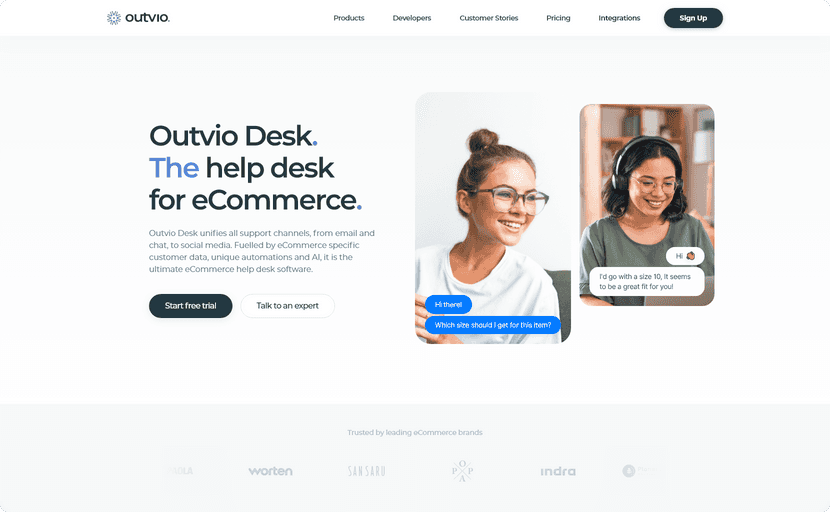
Outvio Desk is a retail-focused help desk that merges customer support with order management: agents handle emails, chat and social messages from one inbox while seeing live shipping, returns and tracking data plus marketing tools.
It uniquely serves both shoppers and carriers, so delivery and logistics issues can be resolved in the same system, giving retailers faster, more accurate service and full operational visibility. This dual focus positions Outvio Desk as the most complete retail help desk to improve customer service experience.
G2 Rating
Main features:
- Unified inbox for all support channels
- Integrated order, shipping, and return management
- AI for ticket classification and automation
- Live chat, macros, bots, and customizable templates
- Social media and carrier integrations
- Full analytics dashboard built for retail)
Pricing: €115 + per-order fee — includes unlimited agents, tickets, automations & voice calls
2. Help Scout
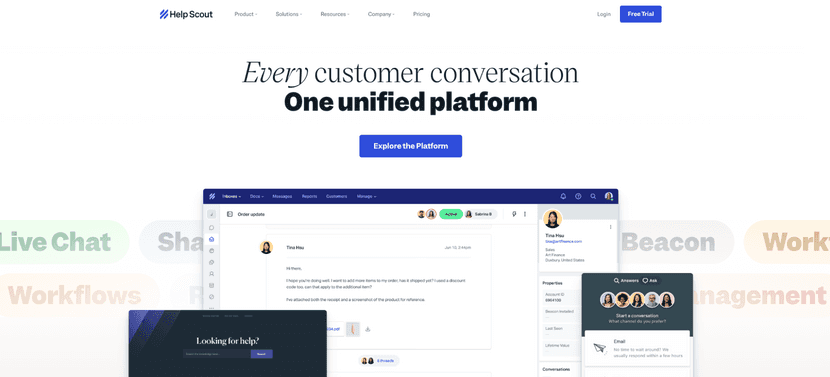
Help Scout offers a clean, email-style interface for handling customer service. It supports email, chat, and social media through a shared inbox. AI-powered features like auto-replies and draft suggestions improve response time, while automation rules help teams stay organized.
G2 Rating
Main features:
- Shared inbox for email, chat, Messenger, and Instagram
- AI drafts and reply suggestions
- Automation rules and workflows
- Help center and documentation tools
- Integrates with many CRM
Pricing: €46 (100 contacts) — Highest: €76 (100 contacts)
3. Freshdesk
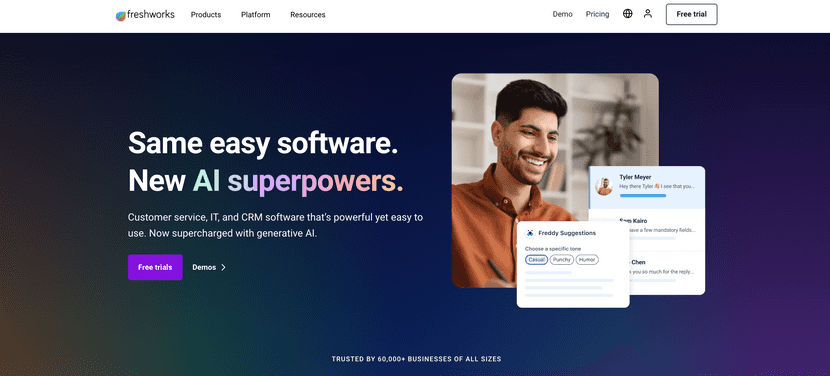
Freshdesk is a well-known help desk with strong omnichannel support. It allows teams to manage live chat, phone support, and customer tickets from a single dashboard. The platform includes ticket automation, chatbot features, and a knowledge base builder.
G2 Rating
Main features:
- Ticketing system with automation rules
- Multichannel support (chat, phone, email, social)
- AI-powered chatbot and canned responses
- Help center with customer self-service tools
- SLA management and analytics
Pricing: €17/agent — Highest: €87/agent
4. Qpien
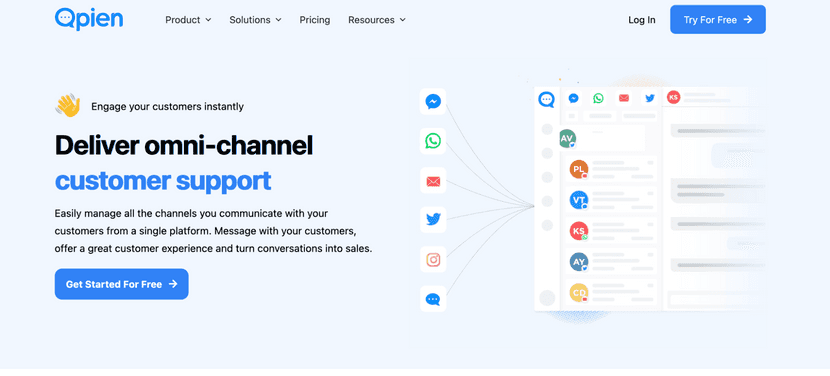
Qpien is a help desk tailored for retail sellers. It unifies communication from marketplaces, websites, and social channels into a single screen. Teams can chat with customers, respond to issues, and handle all tickets in one place, with multilingual support included.
G2 Rating
Main features:
- Centralized inbox and social platforms
- Live chat widget for websites
- Shopify and WooCommerce integrations
- Multilingual support
- Real-time communication tracking
Pricing: €22/agent — Highest: €77/agent
5. Zendesk
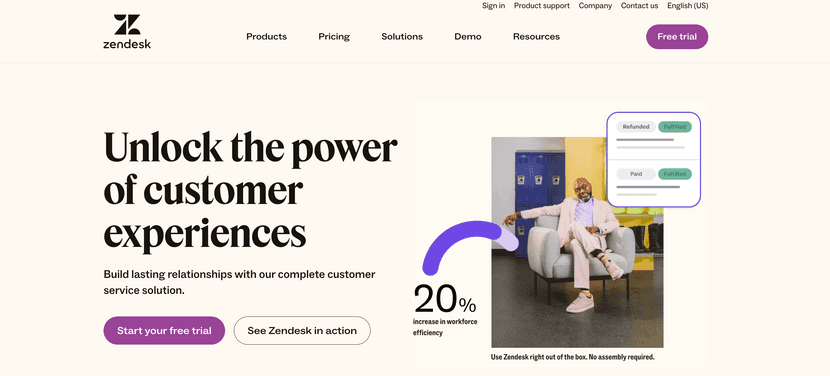
Zendesk is a powerful, enterprise-grade help desk platform. It offers full omnichannel support and allows agents to manage tickets, chats, calls, and social messages in one workspace. The tool also includes automation, reporting, and a robust knowledge base builder.
G2 Rating
Main features:
- Omnichannel messaging across web, mobile, chat, email
- Unified agent workspace
- AI bots and automation tools
- Knowledge base and help center
- Large integration ecosystem
Pricing: €17/agent — Highest: €201/agent
6. LiveChat
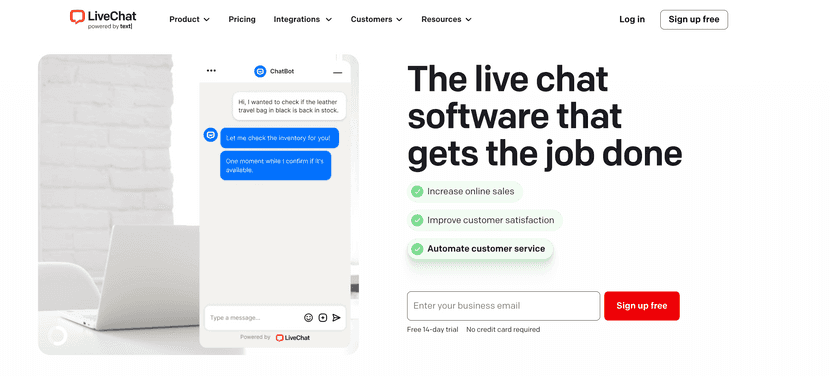
LiveChat is focused on real-time interactions with website visitors. It allows teams to answer questions, recommend products, and resolve issues instantly through a branded widget. It stores chat history and captures customer info during sessions.
G2 Rating
Main features:
- Website live chat with customization options
- Chat archives and customer profiles
- Pre-chat surveys and feedback collection
- Integrations with Shopify, Mailchimp, Google Analytics
Pricing: €17/agent — Highest: €201/agent
7. Kayako
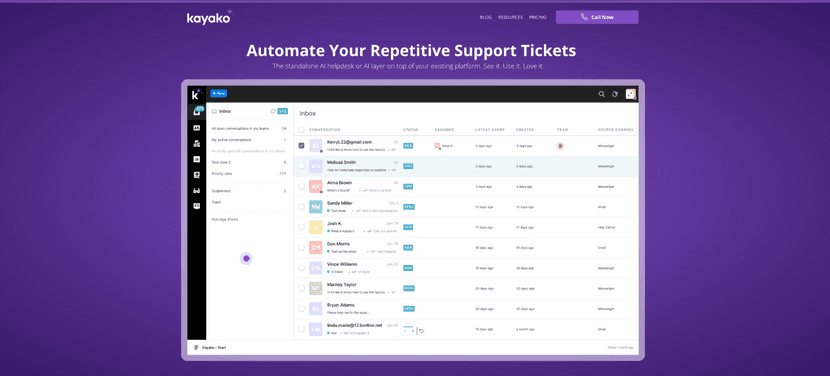
Kayoka is a retail help desk hat consolidates customer conversations into one place. It allows teams to manage messages from email, chat, and marketplaces, using a ticketing system with automation features.
G2 Rating
Main features:
- Unified inbox with ticket management
- AI-powered chatbot
- Integrations with retail platforms and marketplaces
- Customer view with history and context
Pricing: Custom
8. eDesk
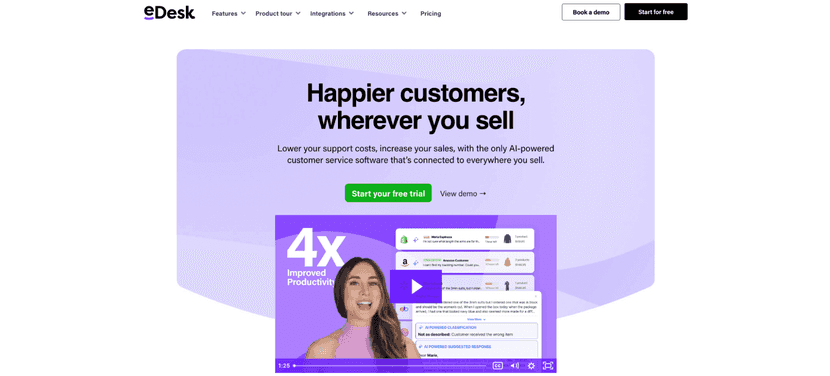
eDesk is purpose-built for retail support teams, especially those selling on marketplaces. It automatically connects support tickets to orders from Amazon, eBay, Shopify, and more. Teams can resolve issues fast with relevant order data shown in every ticket.
G2 Rating
Main features:
- Marketplace and shopping cart integrations
- Auto-response templates
- Order and tracking info in tickets
- Reporting and SLA tracking
Pricing: €45 (1 agent) — Highest: €137 (5 agents)
9. Gorgias
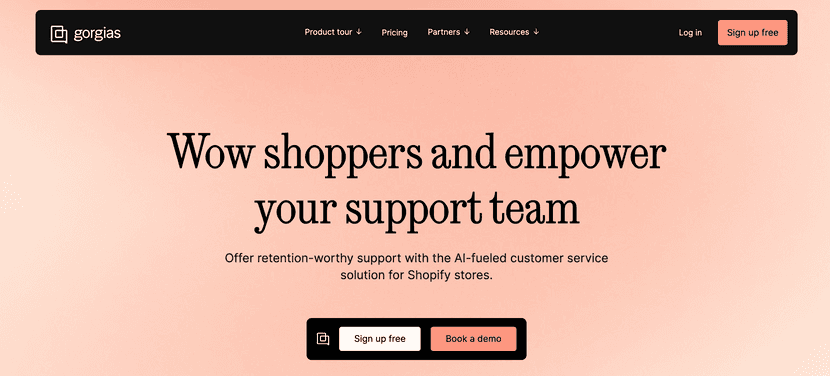
Gorgias is a help desk optimized for Shopify stores. It combines ticketing, live chat, macros, bots, and retail data in a single interface. Teams can reply to customers with full order history, shipping status, and purchase details at hand.
G2 Rating
Main features:
- Shopify integration with order and customer data
- Ticketing, macros, and automated replies
- Live chat and social channel integrations
- Customizable templates and workflows
Pricing: €9 (50 tickets) — Highest: €828 (5,000 tickets)
10. Hiver
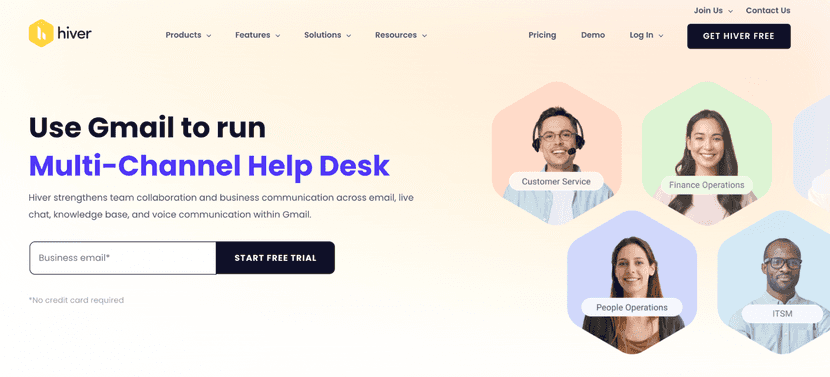
Hiver turns your Gmail inbox into a help desk. It’s perfect for small teams that don’t want a separate tool. You can assign tickets, leave notes, and track performance — all from your existing email setup.
G2 Rating
Main features:
- Gmail-based shared inbox
- Auto-assignment and routing
- Internal notes and ticket statuses
- Reports and SLA tracking
Pricing: €22/user — Highest: €54/user
11. Front
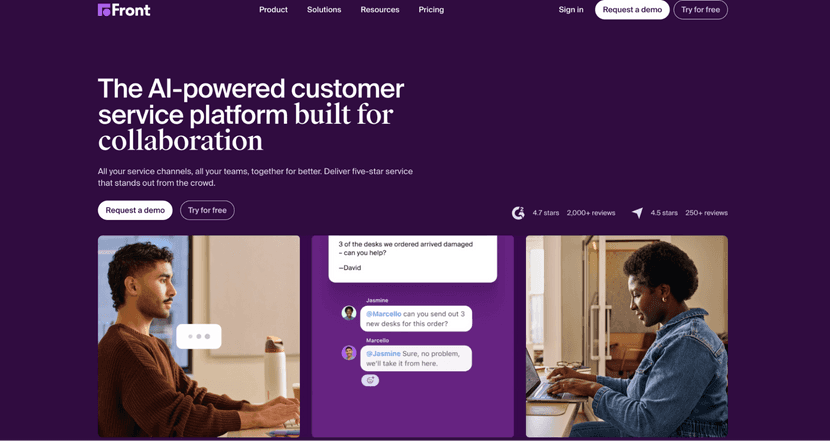
Front is built for teams that want to manage all customer communication in one place. It organizes email, SMS, chat, and social into a single feed, with ticketing tools and collaboration features layered on top.
G2 Rating
Main features:
- Central inbox with full customer context
- Assign and tag conversations
- Analytics and customer satisfaction tracking
- Real-time team collaboration
Pricing: €27/user — Highest: €73/user
12. Dixa
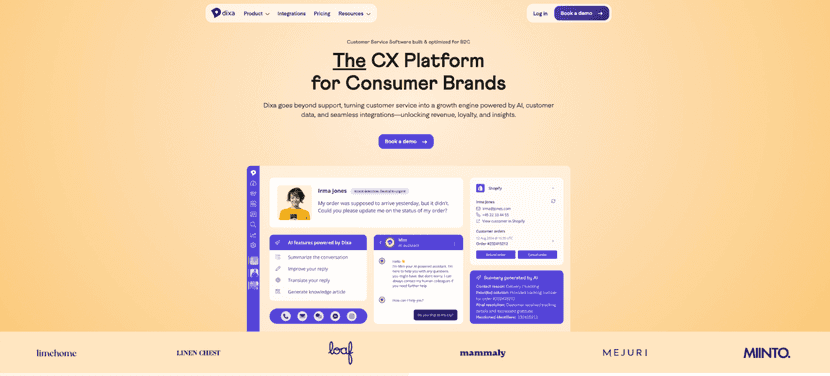
Dixa is a customer service platform with intelligent routing, perfect for medium-volume retail teams. It creates a unified inbox for phone, email, chat, and messaging apps, then routes tickets to the right agent based on skills or availability.
G2 Rating
Main features:
- Omnichannel support
- AI routing and assignment
- Unified workspace
- Ecommerce platform integrations
Pricing: €45/agent — Highest: €198/agent
13. Tidio
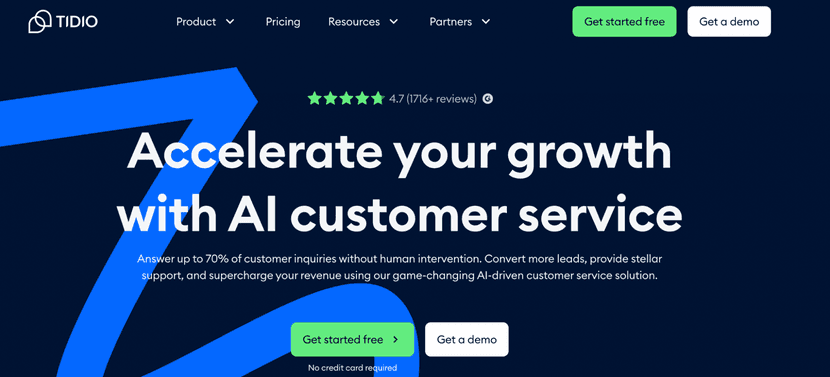
Tidio focuses on real-time chat and chatbot automation. It’s a good fit for online stores that want to boost sales and support through instant replies. Tidio connects to popular retail platforms and lets you track visitors in real time.
G2 Rating
Main features:
- Live chat + chatbot builder
- Retail integrations
- Contact data collection
- Easy-to-use UI
Pricing: €22/month — Highest: €2,759/month
Best practices to improve customer service experience
Keep every detail in one help desk view
When you open a ticket, you should see the order, shipping status, return window, and chat history in a single screen. With that full picture, you answer faster and keep the conversation focused. Use the best retail help desk software to pull all this data together and deliver consistently good support even on busy days.
Let automation handle the routine
Set clear rules for common tasks. For example, create a rule that approves refunds under €50 or triggers a shipment update when a package leaves the warehouse. AI and macros free you to work on the questions that really need human judgment—and you end up helping more customers in the same hour.
Give customers a branded self-service portal
Most shoppers prefer solving simple issues on their own. Offer a portal where they can track orders, start returns, or update delivery details in real time. It feels seamless to them and cuts your ticket volume so you spend time on higher-value conversations.
Turn support data into everyday improvements
Tag every ticket by issue type. Review trends weekly: frequent size exchanges might signal a product detail problem, while repeated delivery questions could point to a carrier delay. Share these insights with logistics or merchandising so the root cause gets fixed.
Track the metrics that truly matter
Focus on first-contact resolution, time to resolution, and agent workload by topic. These numbers show where your help desk software already shines and where small tweaks can further improve customer service experience across every channel.
Follow these steps and your retail team will move from reactive fixes to proactive, customer-led growth—turning support into one of the strongest drivers of loyalty and revenue.
Pricing models: What seems cheap might not be
Many customer support tools use different pricing models. Some may look affordable at first, but they often hide costs that increase as your team, sales, or ticket volume grows.
These are the most common pricing models you’ll find in the market:
1. Subscription model
You pay a monthly or yearly fee to access the service. This is often combined with a per-agent cost, which means the more your team grows, the more you pay.
Example: $20/month per agent × 10 agents × 12 months = $2,400 per year Add more agents, and your bill increases proportionally.
Some platforms also charge extra for:
- Access to integrations
- Enabling the knowledge base
- Adding channels like WhatsApp or social media
2. Pay-as-you-go model
You only pay when you use the system. This may seem fair if you handle few tickets, but it becomes unpredictable with high volumes.
Common costs in this model:
- Per ticket: $2/ticket × 1,500 tickets = $3,000/year
- Automations: Some rules or workflows require additional payment
- Auto-translation: Charged per translated message
- Conversions: Fees if you generate sales from live chat
- AI usage: Fees per chatbot interaction
- Calls: Charged per minute or per handled call
To properly evaluate different pricing models, it’s key to compare the total cost of ownership (TCO) over time. A model that looks cheap upfront could become more expensive later due to hidden fees, scaling limits, or customization needs.
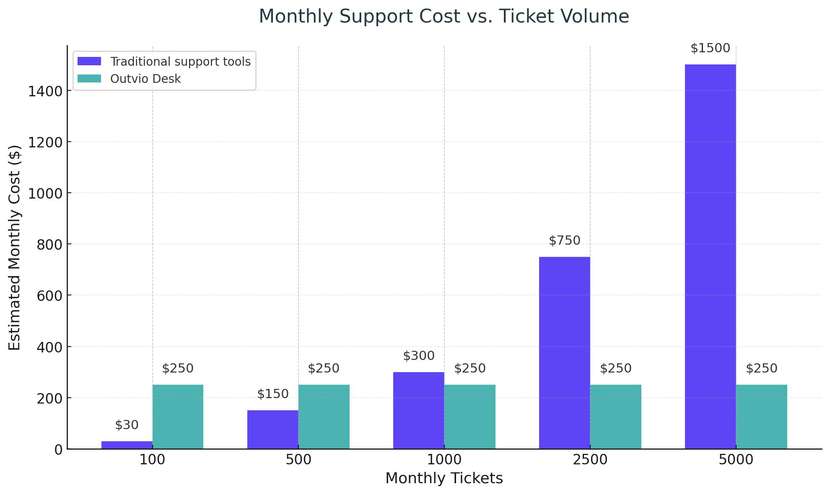
Outvio Desk offers unlimited agents, tickets, automations, and calls at no extra cost. A fixed price with no surprises, no hidden fees, and no limits to your retail business growth.
Current trends shaping customer service in the retail rndustry
Retail customer service has shifted shape. Shoppers move between store, web, and social and still expect one seamless conversation. AI now handles the repetitive checks and sorts each message by urgency, so agents spend their time solving real issues and adding a personal touch. Leadership teams treat service as a growth lever, setting revenue goals for every interaction because good support keeps customers coming back.
Outvio Desk meets these three trends in a single workspace. The platform unifies tickets, chat, smart automations, shipping data, and full order history, then layers AI suggestions that guide agents to the right response in seconds. The result is fast, consistent, and personal service: the best way to improve the customer service experience and turn support into a profit center for any retail brand.
Ready to offer good support without adding complexity? Book a demo and discover why Outvio is one of the best help desk solutions for retail.


